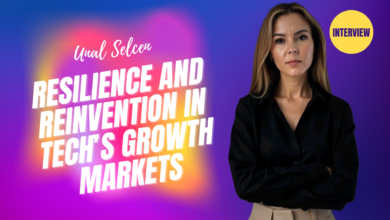“Stay Agile, Customer-Centric, and Future-Ready”

Mohamed Hossam, the Regional Head of Channels for LENA at CyberKnight, says partners who continuously evolve their value proposition and invest in people, process, and partnerships will remain relevant
Could you share an overview of your career path to date, highlighting the pivotal moments or achievements that have shaped your leadership within the IT channel?
Over my 18+ year career, I’ve held several leadership positions across top technology firms, consistently driving channel growth and regional expansion. I currently serve as Regional Head of Channels at CyberKnight for Levant, Egypt, and North Africa, where I lead partner-centric strategies to deepen market presence.
Prior to that, I spent 9 years at one of the leading distributors in the region covering Egypt, Libya and Iraq in addition to east Africa, where I developed solid channel pipelines and built profitable business models tailored to local markets. A pivotal moment in my career was expanding channel coverage in challenging markets while securing strong partnerships and achieving significant sales growth. My engineering background and prior technical leadership roles have allowed me to bridge business with technology effectively.
As a key channel influencer within your company, what are your primary roles and responsibilities in shaping strategy, driving engagement, and fostering growth within the partner ecosystem?
In my role, I’m responsible for developing and executing the regional channel strategy, aligning with corporate goals while tailoring execution to local market dynamics. his includes partner onboarding, enablement, joint business planning, and building strong go-to-market programs.
I engage with C-level executives across our partner ecosystem to ensure alignment, drive pipeline development, and execute strategic initiatives such as new product launches, quarterly business reviews, and tailored marketing campaigns. My approach is hands-on, ensuring our partners are empowered, informed, and equipped to grow profitably.
How would you assess the current health and evolution of the IT channel, particularly within our region? What significant trends or shifts are you observing?
The IT channel in our region is evolving rapidly. There is strong momentum, but also immense pressure for partners to adapt to new models driven by AI, cybersecurity, cloud transformation, and changing buyer expectations. Customers increasingly expect value-added, outcome-based solutions rather than traditional product reselling. We’re also witnessing a push for localized support and bundled services, particularly in the SMB space. The role of distribution is shifting from pure logistics to business development and solution enablement.
What do you see as the single biggest challenge facing the IT channel in the region today, and conversely, what is the most significant untapped opportunity for partners?
The biggest challenge is the channel’s shift from transactional selling to value-driven, service-led models. Many partners are still transitioning their business models and capabilities to offer bundled, recurring, and cloud-based services.
Conversely, the biggest untapped opportunity lies in the commercial and SMB segment, especially in underserved markets like Algeria, Tunisia, Libya and Iraq. Agile partners who can offer localised support, bundled offerings, and business outcome-oriented solutions are best positioned to succeed.
In your opinion, what are the most effective strategies partners can employ to drive sustainable growth and profitability in the current market, especially considering evolving customer demands?
Partners should focus on three core areas:
- Vertical industry specialization to offer tailored solutions
- Investment in emerging technologies like AI, cybersecurity, and hybrid cloud
- Building flexible service-based offerings, including managed services and subscription models.
Forming strategic alliances and co-selling with vendors or other partners can also accelerate scale and credibility. Training and upskilling are crucial to ensure alignment with customer needs and market direction.
How is the rapid advancement of AI, including Agentic AI and Generative AI, fundamentally reshaping the channel’s business models, partner opportunities, and the skill sets required for success?
AI is fundamentally transforming the channel. It shifts partners from being product resellers to solution providers who integrate AI into business processes. Partners now need to invest in AI training, data literacy, and consultative skills to build and deliver AI-powered offerings. This is not just a tech shift—it’s a mindset change.
Given the escalating sophistication of cyber threats, how can channel partners best position themselves to deliver comprehensive cybersecurity solutions, moving beyond traditional offerings to address emerging risks like AI evasion?
Partners must go beyond legacy cybersecurity tools and embrace AI-powered threat detection, continuous monitoring, and zero-trust architectures. Educating customers on new risks such as AI-generated phishing or evasion techniques is critical. Additionally, offering security as a managed service, conducting frequent risk assessments, and staying current on regulatory compliance needs will help partners become trusted advisors rather than just solution providers.
Environmental, Social, and Governance (ESG) factors and sustainability are gaining prominence. How can channel partners integrate these principles into their operations and offerings to create competitive advantages and meet evolving client expectations?
Partners can differentiate themselves by embedding ESG into both operations and customer offerings. This includes promoting energy-efficient technologies, helping clients transition to green data centers or cloud platforms, and adopting transparent, ethical sourcing practices.
Internally, sustainability certifications and inclusive hiring practices are increasingly influencing buying decisions. ESG is no longer optional—it’s a business advantage and a customer expectation.
The IT landscape demands continuous learning. What advice do you have for channel partners on attracting, developing, and retaining top talent, particularly in areas like AI, cloud security, and specialized industry solutions?
Talent is a critical differentiator. Partners should invest in continuous learning programs, sponsor industry certifications, and offer clear career paths. Creating an innovation-driven culture where employees can experiment with emerging tech helps retain top talent. Additionally, partnering with vendors for enablement, and creating internship pipelines with universities, can future-proof the organization’s talent base, especially in specialized areas like AI and cloud security.
How do you see the roles of different partner types—such as Managed Service Providers (MSPs), Independent Software Vendors (ISVs), and system integrators—evolving, and how can they best collaborate to deliver integrated solutions?
The boundaries between partner types are increasingly blurring. MSPs are expanding into consulting, ISVs are creating vertical solutions, and system integrators are building platforms that combine software, services, and cloud infrastructure. Collaboration is key—integrated go-to-market strategies and joint solution development will be essential to address complex customer needs. The future lies in ecosystems, not silos.
Drawing from your experience and looking ahead, what is your most crucial piece of advice for partners seeking long-term success and relevance in this rapidly transforming IT channel?
My core advice is to stay agile, customer-centric, and future-ready. Embrace innovation—especially AI, cloud, and cybersecurity—and focus on building long-term relationships based on trust and measurable business outcomes. Partners who continuously evolve their value proposition and invest in people, process, and partnerships will remain relevant and resilient in the face of transformation.




